WAUKESHA, Wisconsin—Shawn Reilly isn’t looking for attention.
On a cool fall afternoon in early October, Reilly, wearing a thick flannel shirt, is sipping a pint of Oktoberfest at a picnic table in front of the North Pillar Brewing Company, an excellent craft brewery just steps from the office where he puts in time as mayor of Waukesha. The carnival of national politics will arrive the next day in Ripon, about 90 minutes to the northwest, for an event featuring Democratic presidential nominee Kamala Harris and former Rep. Liz Cheney, who will be blessing Harris with her highest-profile Republican endorsement.
Reilly was invited, too, but he declined. A longtime Republican, he, like Cheney, has been disgusted with the GOP. But unlike Cheney, Reilly, who runs the most populous town in the heavily Republican “WOW counties”—Waukesha, Ozaukee, and Washington—has kept relatively quiet about his frustrations, mostly spurning interview requests and political appearances.
But the most important reason he’s skipping the rally? The mayor has other plans. For weeks, he’s been planning to host several dozen friends and colleagues for lunch, and he’s been smoking mounds of brisket to serve them.
Reilly—an environmental lawyer first elected mayor in 2014—takes his meat seriously. He owns a trailer-sized smoker that he’s hauled to barbecue competitions across the Midwest, and he says he’s loath to bail on his commitment even for a splashy event that could help determine the winner of his competitive state. He told the Harris campaign staffer who called that he couldn’t make it. But he might have accepted if the call had come from the honored guest. “It would be a lot easier to say yes to Liz Cheney,” Reilly says, half-shouting over the high-decibel broadcast of the Brewers-Mets playoff game in the background. “Yeah, I don’t want to be in the photo with Kamala Harris. Yeah, to say, you know, I’m going for her. And that’s what they want, right? That’s what they want.”
Reilly has had concerns about the direction of the GOP for years, but his breaking point came on January 6, 2021. He worked all day from his city offices, occasionally hearing reports about unrest at the Capitol and complications in the certification process. But when he got home that night, he turned on the news and spent 45 minutes watching video of the attacks on the U.S. Capitol. He plopped down in a chair in front of the television and banged out a Facebook post.
“This will possibly be the cause of the end of my political career but I have to put this out because I am so upset,” Reilly wrote. “I am ashamed that I was a member of the Republican Party and I do not know how I can ever be a member again.” Even as some Republicans condemned the violence of that day, Reilly held them responsible for going along with Donald Trump’s stolen election claims.
Taking another sip of his beer, Reilly recalls that his wife discouraged him from hitting send. “It was pretty funny. I, like, typed it on Facebook and showed my wife and she goes, she’s like, ‘You idiot. Don’t do that.’”
He ignored her. It was all too much to remain silent. “It was an attack on democracy. It was an attack on the United States. It was an attack on the ability for us to operate under our Constitution, because if we can’t have elections, fair and free elections, we’re fucked.”
For that reason—because January 6 is as much about future elections as it was about past ones—the Republican mayor of Wisconsin’s eighth largest town, in the middle of the deep red Milwaukee exurbs, has decided he’s going to support Kamala Harris for president. He’s not thrilled about it, but he’s got no patience for the Republicans, even those popular in his own state, who once condemned the attacks that day and now, to win an election, want to bury them.
“Right now, it’s like, ‘Get over January 6.’ What’s happening right now? People are making that comment, get over it. It’s like, I’m not over it. I cannot get over it.”
With polling all the way up to Election Day showing a deadlocked contest in Wisconsin and the other six battleground states, the race may well turn on how many other Republicans or former Republicans are, like Reilly, disgusted with the GOP.
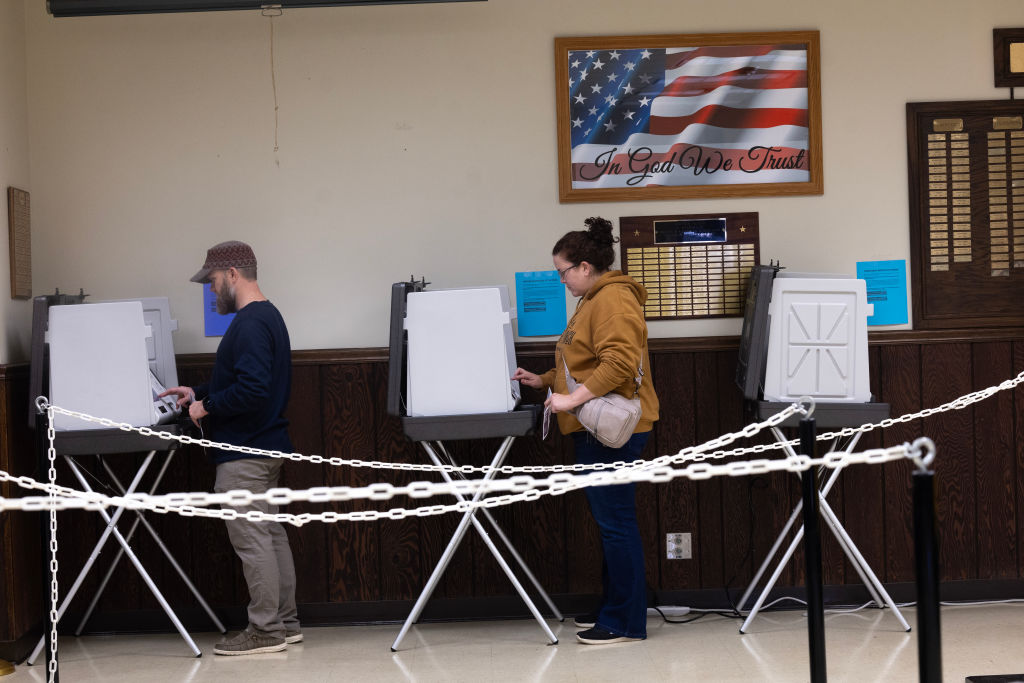
Will it matter?
Beyond current polling suggesting Wisconsin is a toss-up, the recent history of presidential vote counts in the state makes clear why both campaigns are scrapping for every single vote. In 2020, Joe Biden beat Trump by just 20,682 votes out of more than 3 million cast.
Setting aside Barack Obama’s two victories in 2008 and 2012—relative landslides in the context of the past two decades—each of the other four presidential contests since 2000 was decided by less than 1 percent and fewer than 25,000 total votes, out of total ballots ranging from 2.6 million to 3.3 million.
Wisconsin Republicans also have a history of Trump skepticism. In 2016, Trump was sailing toward the party’s nomination when the state’s GOP primary slowed his momentum. Nearly two-thirds of Wisconsin Republicans cast ballots for someone other than Trump, and Ted Cruz beat the frontrunner handily, 48 percent to 35 (with John Kasich netting 14 percent).
Back in April of this year, Nikki Haley won 76,841 votes in the GOP presidential primary, some 13 percent despite dropping out of the race 26 days earlier. More interesting, perhaps, is the fact that Chris Christie, who ran as an in-your-face anti-Trump crusader, received 9,771 votes—nearly three months after he quit. (Ron DeSantis received another 20,124 of the non-Trump vote, despite also having suspended his campaign three months before.)
Wisconsin GOP strategists and elected officials I’ve talked to say most of those non-Trump voters have come home to the party over the last six months. But not all of them. A small but non-trivial—indeed, perhaps decisive—group of Republicans and former Republicans will not vote for Trump, and a second group of Republican-leaners remained undecided going into the final days of the contest.
In the Marquette Law School poll of Wisconsin voters released October 30, the last before the election, Trump had the support of 92 percent of likely Republican voters. But 7 percent of Wisconsin Republicans said they intended to vote for Harris who, by comparison, has 97 percent of Democrats, with just 3 percent who say they’ll vote for Trump. (In the much-debated Des Moines Register poll released Saturday night, which found Harris leading Trump 47-44 in Iowa, pollster Anne Selzer found that Trump only had the support of 89 percent of the GOP.)
Craig Gilbert, longtime political reporter with the Milwaukee Journal Sentinel now affiliated with Marquette University’s Lubar Center for Public Policy Research, knows the Wisconsin electorate as well as anyone. He shared some clues after an analysis of undecided voters from the center’s last three polls. The number of undecideds has declined over the past several months, from 12 percent in June to 5 percent in the latest survey.
They break down this way: “In partisan terms, Republicans and Republican-leaning independents make up the single biggest group (about half the undecideds), followed by ‘pure’ independents (almost 40% of the undecideds), and Democrats and Democratic-leaning independents (only about 10%).”
In raw numbers, if turnout this year approaches the 3.3 million voters we saw in 2020, that’s a pool of 165,000 undecided voters. MU Law poll director Charles Franklin is estimating a turnout between 3,750,000 and 3,800,000, meaning the total number of undecideds could reach 190,000 or more—half of whom are Republicans and Republican-leaning independents. It’s those voters, not undecideds generally, who are the target of the Harris-Cheney messaging about January 6 and Trump’s authoritarian inclinations.
“Are undecided voters really going to take their cues from GOP politicians endorsing Harris?” Ben Wikler, chairman of the Wisconsin Democratic Party, asked in a Twitter thread after Cheney endorsed Harris in Ripon.
It matters to one particular type of voter: highly engaged Republicans who know Trump crossed an uncrossable line. Most undecided voters are deeply cynical about the political process. They assume it’s all rigged behind the scenes. For those voters, arguments about democracy ring hollow, and the messages about freedom and pocketbook issues matter the most. Cheney’s message isn’t for them. The impact of her endorsement is on another type of undecided voter, the Republican who thinks the Constitution and our flag are more sacred than any particular policy issue. For those voters, when Trump disgraced and mocked our troops, when Trump abused the powers of office, and most of all, when Trump fomented a violent mob to end America’s exalted tradition of the peaceful transfer of power—he crossed a line.
So, what will these voters do? Will they, like Shawn Reilly, take the full leap and cast their ballots for Kamala Harris? Or will they instead write in Ronald Reagan or Paul Ryan or cast another protest vote?
Nobody knows, of course. But in a tight race, it could matter.
The un-undecideds.
One day after I had beers with Reilly—and after having failed to secure an invitation to the brisket lunch—I drove to Ripon for the rally with Cheney and Harris. It’s the sort of event where reporters seldom find the undecided voters who could swing the election. As rally attendees lined up for a security check, a small number of protesters gathered in a park near the entrance.
One of them, a retired farmer named John Sina, sat quietly holding a sign. “Baby’s Are Little People.” Sina was wearing jeans, a royal blue polo with the insignia of St. Vincent de Paul, and a hat declaring, “It’s a Sina Thing.” Sina stood out. While he sat quietly, he was surrounded by a raucous group of Trump fans, decked out in MAGA gear and loudly taunting Kamala Harris supporters across the street. I approached him to ask about his sign and what I assumed was his support for Trump.
“What brought you out today?” I asked.
“I’m just expressing what I think is important,” he said.
“Are you a longtime Trump supporter?”
“I’m an independent.”
“You’re here for an issue? Pro-life?”
“That’s a good assumption. I haven’t had anybody find fault with my sign,” Sina explained. “It’s pretty neutral.”
“And you’re not in people’s faces.”
We discussed Trump’s recent adoption of “reproductive rights” language, the legacy of his Supreme Court picks, the housing issues caused by a recent influx of Spanish-speaking immigrants in nearby Fond du Lac. Sina, newly elected council president of St. Vincent de Paul, which helps provide shelter to the homeless, expressed concern that they’ll be unprepared for the winter.
When I asked him why he felt compelled to launch his understated protest, he was circumspect.
“This is an issue—I don’t want to stand before God and say I did nothing. Today’s a beautiful day. I’d rather be fishing but here I am.” Sina took notice of a “we’re not going back” chant from the Harris crowd.
“I have nothing against people with pro-choice views,” he said. “It’ll work out. We can live together. I don’t hate any of these people. They’re here for a purpose and their cause and what they want to be. And that’s just wonderful. You know, this is why we live here. This is America. This is working. This is the way it’s supposed to work. … It’s not going to change my life dramatically.”
As I turned to speak to another protester, two young Harris supporters—young women in their late teens or early 20s—approached Sina and pointed at his sign. “You spelled babies wrong!” one of them shouted, laughing along with her friend. She spelled it out, voice rising with derision. “B-A-B-Y-S! I’m just saying!” Sina quietly noted that his sign had gotten their attention, but the young women, now joined by others as they walked off, were laughing too loud to hear him.
The other Trump supporter I turned to speak to, Pauline Ramsey, held her phone up to film our interview. She is a relatively new activist. She hadn’t voted or paid much attention to politics until Trump ran in 2016, she said, but she’s all in now. She doesn’t like Harris for a host of reasons including, she said, Harris’ history of locking up parents of children with disabilities and her promotion of open borders.
Ramsey took a break from our interview to respond to the “We’re not going back” chants of Harris supporters. “You are going back! You are going back! Send the criminals back! Send the criminals and illegals back!”
The “We’re not going back” chants continued.
“Oh, you are! You’re goin’ back or you’re going to hell, one of the two!”
When our conversation resumed, I asked Ramsey why she supports Trump. She rattled off a long list of policy priorities—energy efficiency, pipelines, crime, opposing the trafficking of children and women, gun rights, and preserving the Bill of Rights and the Constitution. She punctuated her list by turning to character. “And he’s a man of God.”
“What is it that makes you say he’s a man of God?” Ramsey looked at me like I’d asked, What makes you say he’s a giraffe?
“He is a man of God,” she responded. “Through the whole time he has spoken he has always gotten God into his talking points.”
“What do you say to people who say, geez, he’s cheated on his wife, he’s been profane, he’s hooked up with a porn star?”
“Well, you’re not supposed to listen to gossip,” Ramsey snapped.
“You think it’s just gossip?”
“Well, it could be gossip but I’m not here to judge. There’s only one person here to judge and that’s God,” she said, pausing before she continued. Then: “You’ve got Kamala, who’s on the other hand, she’s got a whole line of going to clubs, sleeping with, you know, married men and so forth.”
“Is that not gossip?”
“That’s actually been proven.”
“You’ve got proof on that but not on the Trump stuff?”
“I have no idea.”
Ramsey is very unhappy with Liz Cheney—if not altogether certain who she is. “I don’t even know who she is. So my thing is, Liz who?” It wasn’t clear to me if she was being serious or putting me on. I explained that Cheney is a longtime Republican attending the rally to endorse Kamala Harris and encourage other Republicans to do the same. How does she feel about that?
“She’s changed her views and beliefs and morals,” Ramsey said.
Which ones?
“Everything that Republicans stand for,” she insisted. When I pushed her again for specifics, explaining that I haven’t seen many changes in Cheney’s policy views, she shook her head and said nothing.
“I just know if they change from one party to another, there’s a particular reason and if they change there’s nothing you can do about it. And if they’re changing then, you know, you’re not going to go for that person.”
“Do you know that Donald Trump used to be a Democrat? So he changed his party.”
“We all change.”
“Does that apply to him?”
“We all change, you know.”
That’s true of Jessica Agnew, a leader of the pro-Trump group at the rally, shouting anti-Cheney sentiments at the Harris supporters in line. Agnew is one of those Obama-Trump voters who have confounded political strategists of both parties, having been a “Kennedy Democrat” until she voted for Mitt Romney—“unfortunately, because he was the only choice I had to vote for”—in 2012. She is now an organizer of “Trump Force 47,” the Trump campaign’s get-out-the-vote effort. Agnew is focused on getting low-propensity voters to the polls. Like Ramsey, she has no patience for Cheney. But unlike Ramsey, she’s familiar with the former GOP leader.
“That’s why I’m here today,” she said. “Because, you know, we got to show support for Trump where we can. And I feel very offended that Liz Cheney is bringing Kamala Harris to the birthplace of the Republican Party. … I mean, that’s, that’s a big middle finger.”
As we wrapped up our conversation I asked if she has any relation to Spiro Agnew, Richard Nixon’s vice president. “That’s my husband’s family,” she said. I mentioned Agnew’s famous line about the “nattering nabobs of negativism,” often misattributed as a critique of the media. “Most of it is, most of it is,” she says. “But then you got the good guys fighting, the good fights, the real reporters, the real journalists who are trying.” She said it’s important to have a varied media diet, especially in this polarized political moment. “It’s not like I’m watching just sycophant right wingers say all these wonderful things. I get both sides, right, because it’s important to get both sides. Because otherwise you’re in a bubble like they are, and I’m not gonna live my life like that.”
I asked her where she gets her information. “Oh, you got—Glenn Greenwald’s good. I mean, obviously he’s down, straight down the middle. He criticizes both sides. I love that about him. And then you’ve got, like, Christopher Rufo, he’s really good. Obviously, Mike—Michael Shellenberger. They’re, you know, Substacks.” Agnew went on to mention Matt Taibbi, Julio Rosas at The Blaze, and Tim Pool’s “Scanner News” and Timcast. (One month before our conversation, Pool had been named as one of several right-wing personalities whose work had been secretly funded by the Russian government as part of Vladimir Putin’s ongoing effort to sow confusion and division in American politics.)
“Then there’s another guy, Baker, oh gosh, I can’t think of his first name. Now he works for The Blaze. He’s doing a lot of January 6 reporting, okay, like on the pipe bombs, things like that, but he’s gotten some, really, he actually got in trouble. They want to put him in jail for January 6 because he was reporting. He was literally just reporting, and now they’re claiming he was doing bad things, which is crazy. Now, this is four years later, almost, yeah, coming after him. Steve Baker, that’s his name … It’s a shame, and it just shows you the weaponization.”
According to federal charging documents, Baker spent 37 minutes in the U.S. Capitol on January 6, 2021. He was not affiliated with any media organization when he joined the mob in the Capitol (he apparently sold video footage to some media outlets later), but has subsequently joined The Blaze. Yet he was no neutral observer of events that day.
In a post before the riots on January 6, Baker wrote: “WE are not going to lay down to any level of tyranny — whether it come from the right or the left, the Democrats or the GOP.” He said he was “hoping to document on video anything ‘special’ that might happen, and perhaps get a few interviews from a variety of voices.”
Baker is unapologetic about his presence in the Capitol building and, in a post after those attacks, praised those who sought to stop the certification of the 2020 election, writing that he confesses to “being truly inspired at the sight of so many patriots about to make what would surely be a powerful visual statement to the oath-breaking criminals who — at that very moment — were debating the certification of the Electoral votes.” In an interview with a local Washington news station just hours after the attacks, Baker said: “Do I approve of what happened today? I approve 100 percent. Yeah.”
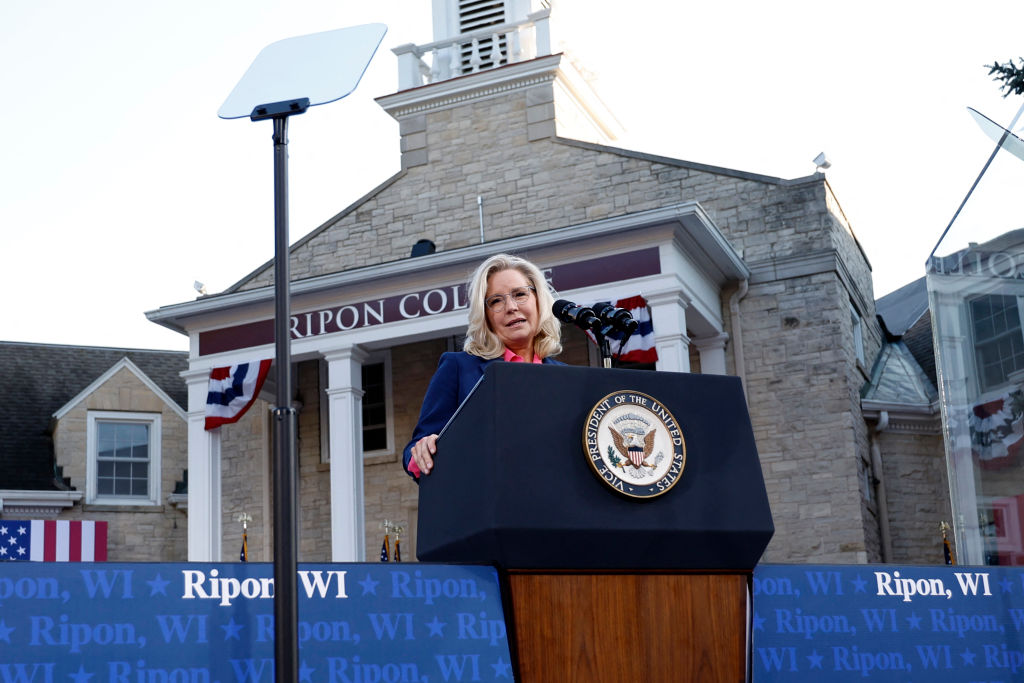
Inside the rally, Liz Cheney’s endorsement of Harris centered on January 6. The crowd inside was mostly partisans drawn from key Democratic Party constituencies. There were many top elected officials, local get-out-the-vote volunteers, and hordes of busy-looking campaign staffers. There were groups of union members scattered throughout the crowd, identifiable by the colors of their union shirts. “Wisconsin Teamsters for Harris-Walz” in blue. “LIUNA for Harris-Walz” in orange. The clenched fist of the Communications Workers for America against a red backdrop.
None of the nearly two dozen people I chatted with that day was a gettable voter of the kind that might decide the election. But Cheney’s messaging—centered on January 6—was meant for those disaffected Republicans and GOP-leaning independents who would see clips of it later:
When Donald Trump woke up on the morning of January 6, 2021, his intention, despite having lost the election, was that he would remain president. Rather than accept his loss and concede defeat, he had spent months overseeing a multi part plan to attempt to seize power and remain in office. He ignored the rulings of the courts. He corruptly pressured state legislatures, including here in Wisconsin, to overturn the results of their elections. He told the Justice Department to lie for him. He conspired to have fake electoral votes cast and he corruptly pressured his vice president to take illegal and unconstitutional actions.
He summoned a mob to Washington, D.C., with his lies, and he sent the armed mob to the United States Capitol in an effort to stop the counting of electoral votes. As the violent mob attacked our Capitol in Donald Trump’s name, as they brutally beat law enforcement officers, as they hunted the vice president and the speaker of the House, Donald Trump watched the attack on television for hours.
Sitting in the dining room next to the Oval Office, he refused repeated pleas from his family, from his closest advisers, from the most senior officials in his campaign and in our government to tell the mob to leave.
And when Donald Trump finally did speak publicly after hours of violence, after the Capitol had been invaded, he praised the rioters. He did not condemn them. That’s who Donald Trump is.
She reminded her audience that the details about what Trump did that day came largely from the testimony of Trump staff and advisers, the people Trump handpicked to serve alongside him.
It’s not just Trump, she argued. In the town often cited as the birthplace of the Republican Party, Cheney lambasted top GOP officials who have downplayed January 6 in their efforts to reclaim the White House.
“Now, sometimes people will say, you know, January 6 wasn’t that big a deal. You know, in a time when I have heard many pretty stunning things from Republicans, one of the most stunning was yesterday from your former governor, Scott Walker, who said, basically, people are over January 6,” she said, generating a loud chorus of boos from the partisans in the crowd.
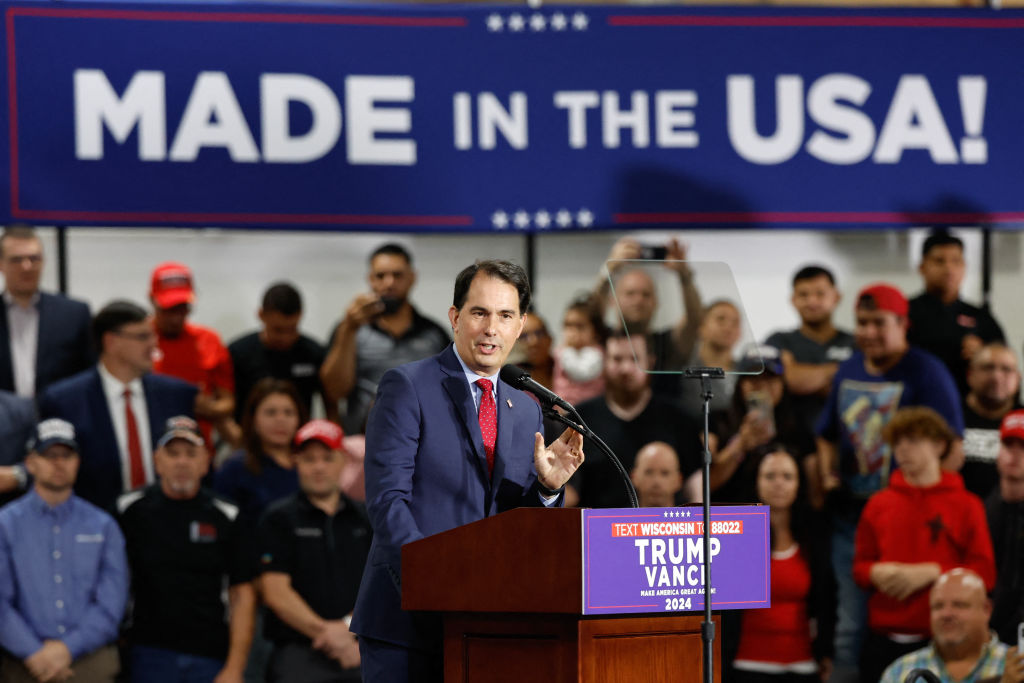
Have voters moved on like the GOP has?
Walker did, in fact, argue that voters don’t care much about the attacks on the U.S. Capitol in 2021. The former two-term Wisconsin governor was live-tweeting the October 1 vice presidential debate between J.D. Vance and Tim Walz that ended in a heated disagreement about January 6. Walker punctuated his steady stream of taunts and observations—“Liar liar pants on fire [fire emoji]” and “Governor Walz sounds like the guy trying to sell you a used car”—by tweeting: “Voters are long over January 6. Walz and the moderators are obsessed while most Americans are focused on issues related to high prices, border security, public safety, and free speech. They are tone deaf.”
I caught up with Walker by phone last week as he shuttled from meeting to meeting in Dallas, in his role as president of Young America’s Foundation. Walker says Cheney “mischaracterized” what he said. “She acted like I explained it away. I just said, whether you like it or not, the reality is that’s where voters are.”
There’s some support for Walker’s claim about voter sentiment. A New York Times/Siena poll conducted in April asked voters to describe one thing they remember about the Trump presidency. Only 5 percent specifically cited the attacks of January 6. “I talk to voters. Nobody brings it up to me,” Walker said. Recent polling tells us that voters care most about the economy, inflation, abortion, and immigration, among other issues.
The NYT/Siena poll found, however, that 39 percent mentioned Trump’s behavior more generally. Surely some of those respondents had in mind the former president’s lies about the 2020 election and subsequent attempts to steal it. So maybe it’s more than 5 percent.
But even if January 6 ends up being important to the results of this election, it doesn’t matter as much as Shawn Reilly or Liz Cheney or I think it should. And that has implications for the country beyond the results of this election.
Nearly 10 years into the Trump era, I’ve reached the point where there’s very little that genuinely surprises me—especially the cowardice of elected officials. What started as a sheepish reluctance to condemn Trump’s ugly attacks on Carly Fiorina or his mocking of a handicapped New York Times reporter during the 2016 campaign became an almost comical effort on the part of his supporters to avoid reporters every time Trump, as president, said or did something outrageous. I’ve had dozens of heated arguments with Republican officeholders about their willingness to abet his norm-distorting behavior with their public silence.
What I could never imagine, even as my own cynicism grew, is the GOP evolution regarding January 6—from the clear-eyed, near-unanimous condemnation of that day to the Trump-accommodating dismissiveness we see today.
It’d take me several pages to collect and reproduce the denunciations of Trump from elected Republicans and top right-wing media personalities. I’ll spare you. But here’s Senate Minority Leader Mitch McConnell, mincing no words. “There’s no question, none, that President Trump is practically and morally responsible for provoking the events of the day. The people who stormed this building believed they were acting on the wishes and instructions of their president. And having that belief was a foreseeable consequence of the growing crescendo of false statements, conspiracy theories, and reckless hyperbole which the defeated president kept shouting into the largest megaphone on planet Earth.”
Sen. Ted Cruz called it a ”terrorist attack,” and Sen. Lindsey Graham dramatically announced that he was disembarking the Trump Train.
Sen. Marco Rubio didn’t have the guts to mention Trump by name, but his condemnation of the former president—the peddler of a “ridiculous conspiracy theory”—was nonetheless unmistakable. “There are growing signs that many of those in that mob were believers in a ridiculous conspiracy theory, and others were lied to—lied to by politicians who were telling them that the vice president had the power to change the election results. And the result is that now, four people have died, police officers were seriously injured, and our country was embarrassed before the entire world.”
These same Republican leaders who once told us that Trump’s behavior was horrifying, maybe criminal, are now telling us that the man responsible for those lies and the attacks that followed must be our next president. It is, even after everything we’ve seen over the past 10 years, disorienting.
I brought all this up with Walker on our call. “It feels to me like people were saying three years ago, ‘that was disqualifying’, but now in this context, it’s not only not disqualifying, ‘we’re strongly for the guy.’ I just don’t get that,” I said.
“I never said it was disqualifying,” Walker told me. “I would say then, as I did now, that I wish he’d handled it differently … Legally and even morally, I don’t hold Bernie Sanders accountable for the guy who shot Steve Scalise, even though I think you can follow a clear path of rhetoric that motivated that guy to get to the point where he’s at, but to me, I say no, the guy who went and did that is responsible for his actions.”
I remain unconvinced.
Last week, just eight days before Election Day, Mayor Shawn Reilly decided he would make an appearance on behalf of Kamala Harris and Tim Walz. The prediction he’d made on January 6, 2021—that his political career might be over because he was speaking out—turned out wrong. Reilly was reelected in 2022. In a brief campaign stop at Copilot Coffee in downtown Waukesha, Reilly, dressed in a jacket and tie, read remarks from a legal pad as he stood next to Walz. He reminded voters and the assembled press that he is a Republican and spoke of voting for Republican presidential candidates from 1980 through 2016.
“For me, January 6 was a true turning point,” he said. “On January 6, Donald Trump encouraged thousands to attack the Capitol in an attempt to overturn the election,” he said. “He doesn’t regret it. He continues to say the election was stolen.”
How many other Republicans feel the same way? We don’t know how much January 6 will matter from an electoral perspective, but the fact that most of Reilly’s old party—once the party of personal responsibility—is telling us that it doesn’t matter suggests that our politics are in a very bad place.
McConnell’s denunciation of Trump included a hint that he hoped the former president would be held accountable by the legal system. “He didn’t get away with anything yet,” McConnell said a couple of years before endorsing Trump’s reelection.
We’ll see.
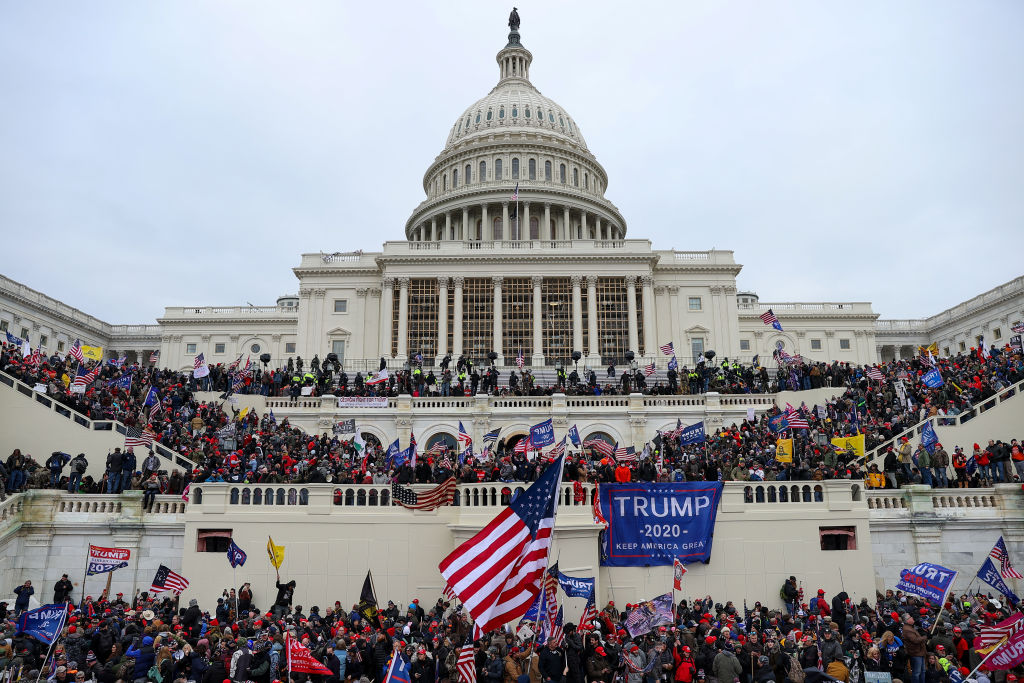


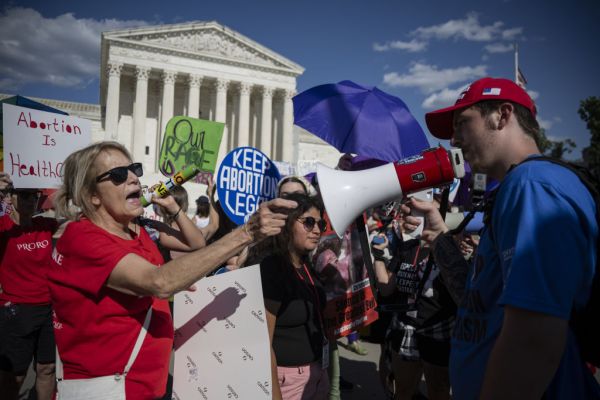

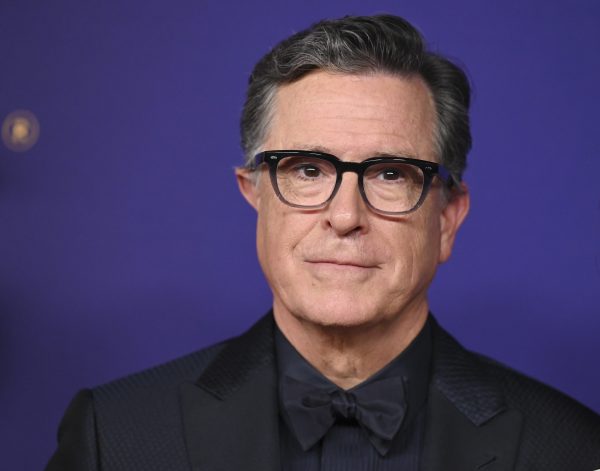
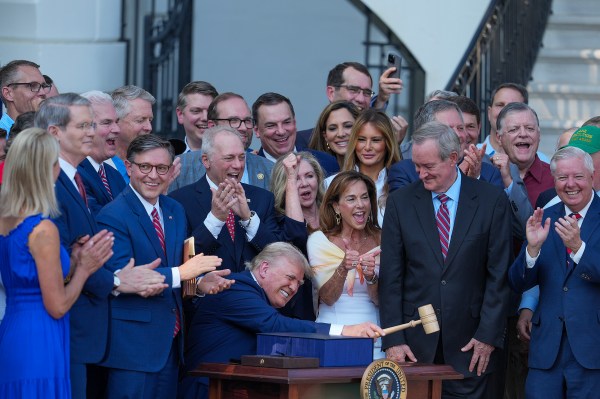
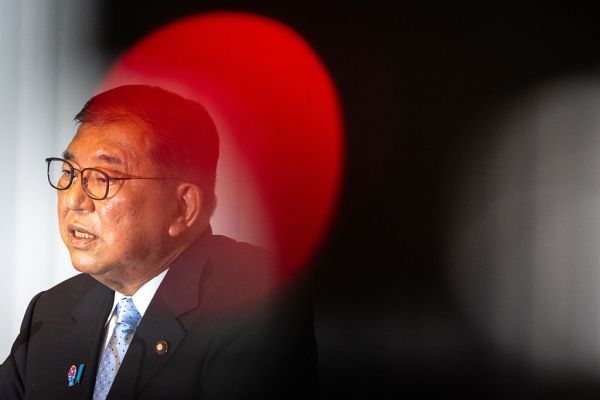


Please note that we at The Dispatch hold ourselves, our work, and our commenters to a higher standard than other places on the internet. We welcome comments that foster genuine debate or discussion—including comments critical of us or our work—but responses that include ad hominem attacks on fellow Dispatch members or are intended to stoke fear and anger may be moderated.
With your membership, you only have the ability to comment on The Morning Dispatch articles. Consider upgrading to join the conversation everywhere.